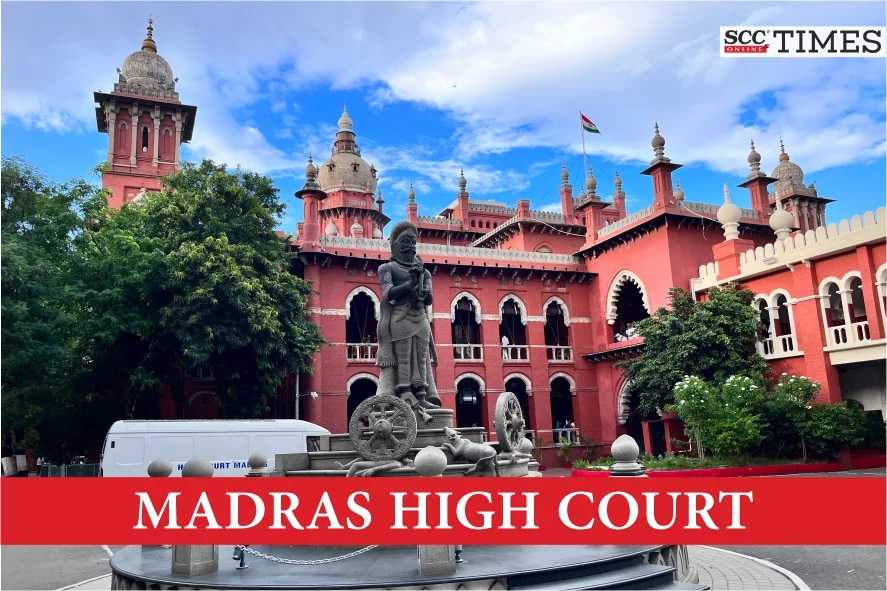Madras High Court: In a writ petition filed for calling and quashing of records pertaining to a Government Order, passed by the State, and to pay salary and all terminal benefits due to the petitioner, the division bench of S.M Subramaniam and K. Rajasekar, JJ. while dismissing the petition, opined that the Judicial Officers are expected to maintain high level of integrity and as the proved charges are grave in nature, touching upon the integrity and honesty of the Judicial Officer. Therefore, the punishment of removal from service, cannot be construed as disproportionate to the gravity of the proved charges. Thus, there is no infirmity in respect of the procedures followed in the departmental disciplinary proceedings.
Background:
The petitioner was appointed as Civil Judge (Junior Division) in the Tamil Nadu State Judicial Service in 1988. Later, he served as IV Additional District Judge, from 2010 to 2013.
The petitioner was placed under suspension and not allowed to retire on the date of his superannuation in 2013 in contemplation of enquiry into grave charges under Rule 17(b) Tamil Nadu Civil Services (Discipline and Appeal) Rules (‘Discipline and Appeal Rules’).
A letter enclosed with a compact disk requesting identification of voices in the compact disk, containing a telephonic conversation amongst three persons was addressed to the Registrar (Vigilance) in 2011. Subsequently, a complaint was also received from an Advocate requesting to register a case and to probe the tapes circulated, regarding the telephonic conversation purported to have the voices of a Sessions Court Judge, the prime accused in amurder case and his relative discussing monetary payments and promised payments.
This complaint was placed before the Administrative Committee (‘AC’) which nominated an Enquiry officer to conduct preliminary enquiry into the complaint. Consecutively, an enquiry report was submitted which contained the forensic science expert’s opinion indicating editing of the source audio files, content of which can be authenticated only after examining the actual recording devices. The expert also stated that the complainant had not cooperated with the enquiry. The complainant then filed a writ petition before the Madras High Court praying to direct the Registrar (Vigilance) to commence statutory investigation by registering an FIR based his earlier complaint.The Division Bench disposed the writ petition directing a specialised personto conduct further enquiry and submit its report
The report submitted by the specialised person established the fact that the alleged conversation did not contain the voice of the alleged Sessions Judge but that of the present petitioner. The Administrative Committee resolved to proceed against the present petitioner and a section officer of Madras High Court and directed the Registrar (Vigilance) to conduct further enquiry against both of them. The explanations given by the petitioner was not found satisfactory, and the administrative committee ordered to frame charges.
The enquiring judge found four out of the five charges are proved against the present petitioner. The petitioner was imposed with punishment vide the government order which included removal from service. The said order came to be challenged in the present writ proceedings.
Contentions, Analysis and Decision
The Court said that the contention of the petitioner that two enquiries cannot be conducted against departmental disciplinary proceedings is incorrect.. asthe one was a preliminary enquiry to ascertain the truth and the same cannot be equated with a domestic enquiry conducted after framing of charges. The Court also highlighted that the departmental disciplinary proceedings commences only when charges are framed under the Discipline and Appeal Rules.
The Court said that such preliminary enquiry is conducted to avoid initiation of unnecessary departmental disciplinary proceedings against the Judicial Officers and the staff members and even during the preliminary enquiry, opportunities were afforded to all the persons to place the facts and the materials. The Court also mentioned that the initial report submitted was not found sufficient enough against the petitioner.
The Court also said that non-examination of original recording devices is not a ground to exonerate the petitioner, since the Enquiry Officer in his report, categorically made a finding that voice samples have been identified and admitted by them, which have been compared by the Experts.
Concerning the compliance of rule of natural justice, the Court said that it was followed scrupulously by the Disciplinary Authority. A preliminary enquiry was conducted to ascertain the truth with the assistance of the Forensic. Sciences Department’s report, after finding a prima facie case for initiation of departmental disciplinary proceedings, the charges were framed under Rule 17(b) of the Discipline and Appeal Rules. The delinquent Officials submitted their explanations and participated in the process of enquiry.
Regarding the quantum of punishment, the Court opined that the Judicial Officers are expected to maintain high level of integrity and in the present case, the charges against the petitioner, were held proved. The proved charges are grave in nature, touching upon the integrity and honesty of the Judicial Officer. Therefore, the punishment of removal from service, cannot be construed as disproportionate to the gravity of the proved charges.
Thus, theBench did not find any infirmity in respect of the procedures followed in the departmental disciplinary proceedings and chose not to interfere with the quantum of punishment.
[A. Rajasekaran v. State of Tamil Nadu, 2024 SCC OnLine Mad 426, decided on 18-03-2024]
Advocates who appeared in this case :
For the Petitioner: Advocate V. Prakash for Senior Counsel M. Palanivel
For Respondent 1: Additional Government Pleader M. Jayanthi
For Respondent 2: Senior Counsel V. Ayyadurai for Advocate Durai Eswar







